03 Jun2021
By Kristin Hamilton
The National Board of Professional Teaching Standards is an anti-racist and inclusive organization. We believe that educators must help students consider their role in a diverse world, value individual differences, and—especially in times such as these—we believe in the power of the teaching profession to defend what is good and right for all people.
The National Board for Professional Teaching Standards is seeking applicants from the educator preparation community to serve on the committee that will develop standards in the areas of diversity, equity, and inclusion. These Board certification standards for practicing teachers also impact teacher preparation programs and assessments, professional learning programs, and state licensure systems across the country. The 10-12 committee members will receive an honorarium and will be representative of the diversity among teaching professionals and the students and communities they serve.
14 May2021
By Nicole Dunn
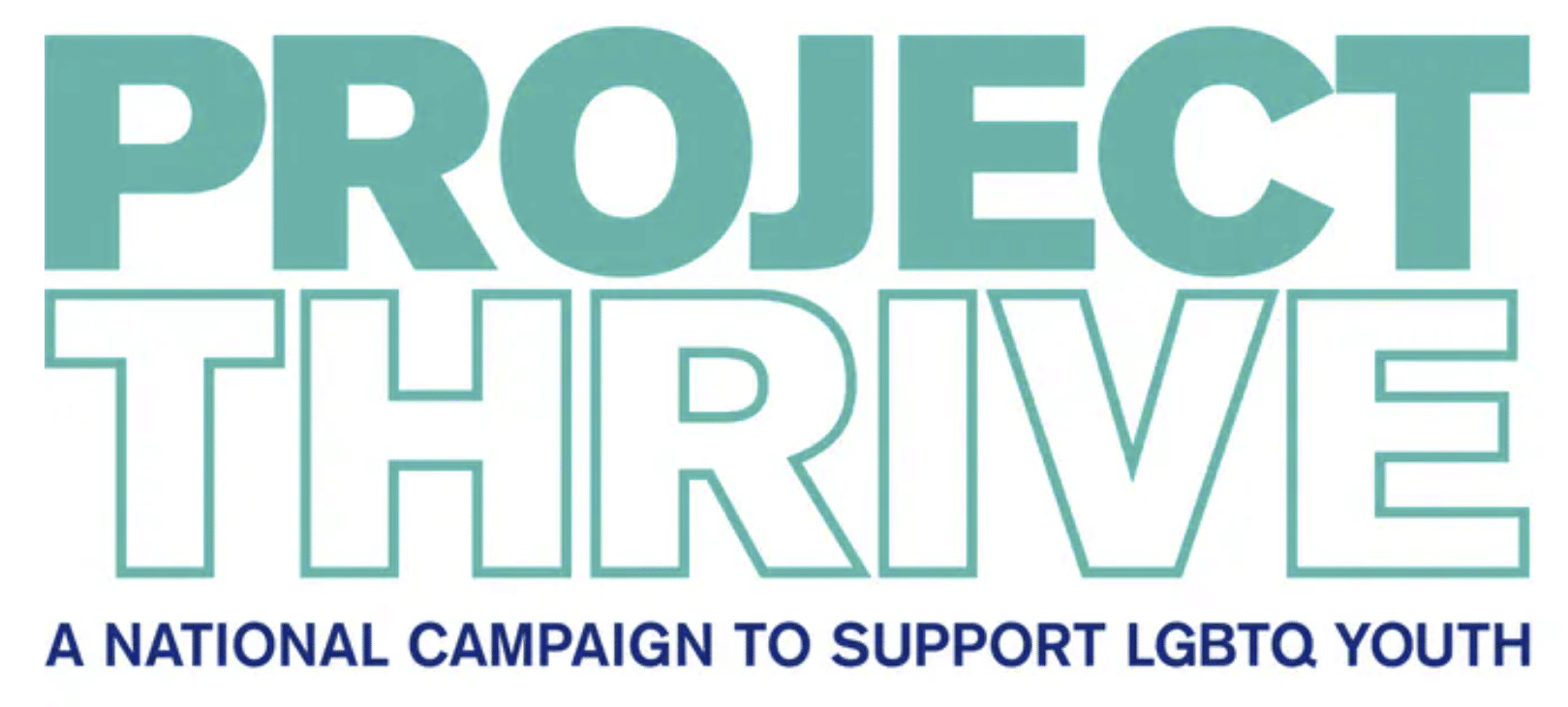 AACTE is honored to share that it has joined the leaders from the nation’s largest health, education, child welfare, legal, and juvenile justice organizations in support of the Human Rights Campaign’s Project THRIVE, a multi-year national campaign to create more equitable, inclusive support systems and communities for LGBTQ youth. The initiative will build the skills and capacities of all youth-serving professionals to better meet the needs of LGBTQ young people.
AACTE is honored to share that it has joined the leaders from the nation’s largest health, education, child welfare, legal, and juvenile justice organizations in support of the Human Rights Campaign’s Project THRIVE, a multi-year national campaign to create more equitable, inclusive support systems and communities for LGBTQ youth. The initiative will build the skills and capacities of all youth-serving professionals to better meet the needs of LGBTQ young people.
Every organization that is part of Project THRIVE has a unique role to play in strengthening family permanence and support, improving health and well-being, increasing school connection, and building a foundation of resilience so that all LGBTQ youth can thrive. Project THRIVE is committed to an intersectional approach in this work, and to ensuring that LGBTQ youth of color and those who are system-involved or have a history of homelessness are a priority focus.
05 May2021
By Weade James

AACTE is pleased to announce the selected states for the Consortium for Research-Based and Equitable Assessments (CREA), a new initiative supported by the Bill & Melinda Gates Foundation. The Consortium, comprised of 14 state teams that include educator preparation programs (EPPs) and their state and local education agencies, will evaluate cut scores for entrance into EPPs, and develop recommendations and model state policies to support state efforts to advance equity and recruit more diverse teacher candidates into the profession.
The 14 selected states and institutions include the following:
04 May2021
By Shandra M. Claiborne-Payton

It is the time of year when AACTE puts out a call for nominations to its programmatic advisory committees. These committees serve the association by providing expert member advice on a wide range of topics related to AACTE’s programs and services. Whatever your professional interests, there is likely a committee that would benefit from your participation.
Have you thought about nominating yourself, but wondered whether serving on one of these committees would be right for you? I can assure you that serving on a programmatic advisory committee is enjoyable, rewarding, and a great professional networking and learning experience. By serving on a committee, you will:
- Ensure that AACTE’s programs and services meet your needs and the needs of your colleagues and institution
- Broaden your professional network to include colleagues from a wide range of institutions around the country
- Deepen your understanding of educator preparation
- Have fun interacting with smart and committed AACTE members and staff
29 Apr2021
By Marquita Grenot-Scheyer
This article originally appeared in Diverse Issues in Higher Education and is reprinted with permission.
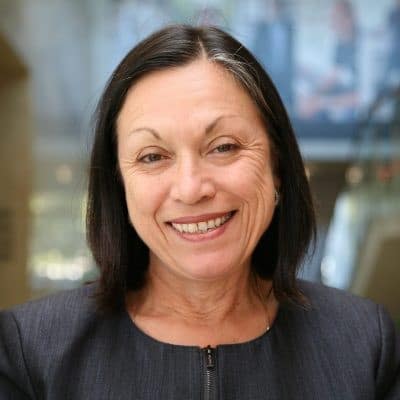 The COVID-19 pandemic shed a harsh light on the systemic inequities in schools and communities. If we believe schools are the epicenter to dismantle racism and inequities, then we must examine our role as teacher educators to address these issues of inequality. How can we use this inflection point to positively and substantively change educator preparation?
The COVID-19 pandemic shed a harsh light on the systemic inequities in schools and communities. If we believe schools are the epicenter to dismantle racism and inequities, then we must examine our role as teacher educators to address these issues of inequality. How can we use this inflection point to positively and substantively change educator preparation?
Both at the system level and on individual campuses, colleges of education must ensure that programs prepare graduates to enter the teaching profession ready to advocate for and implement racial and social justice and advance the transformation of inequitable structures in schools. The pandemic has opened a window into the complexities of the teaching and learning process, which has resulted in greater collaboration among educators and families. As we move forward, we must ensure that candidates’ dispositions reflect and respect the importance of collaboration with students, families, and educational colleagues.
26 Apr2021
By Jerrica Thurman
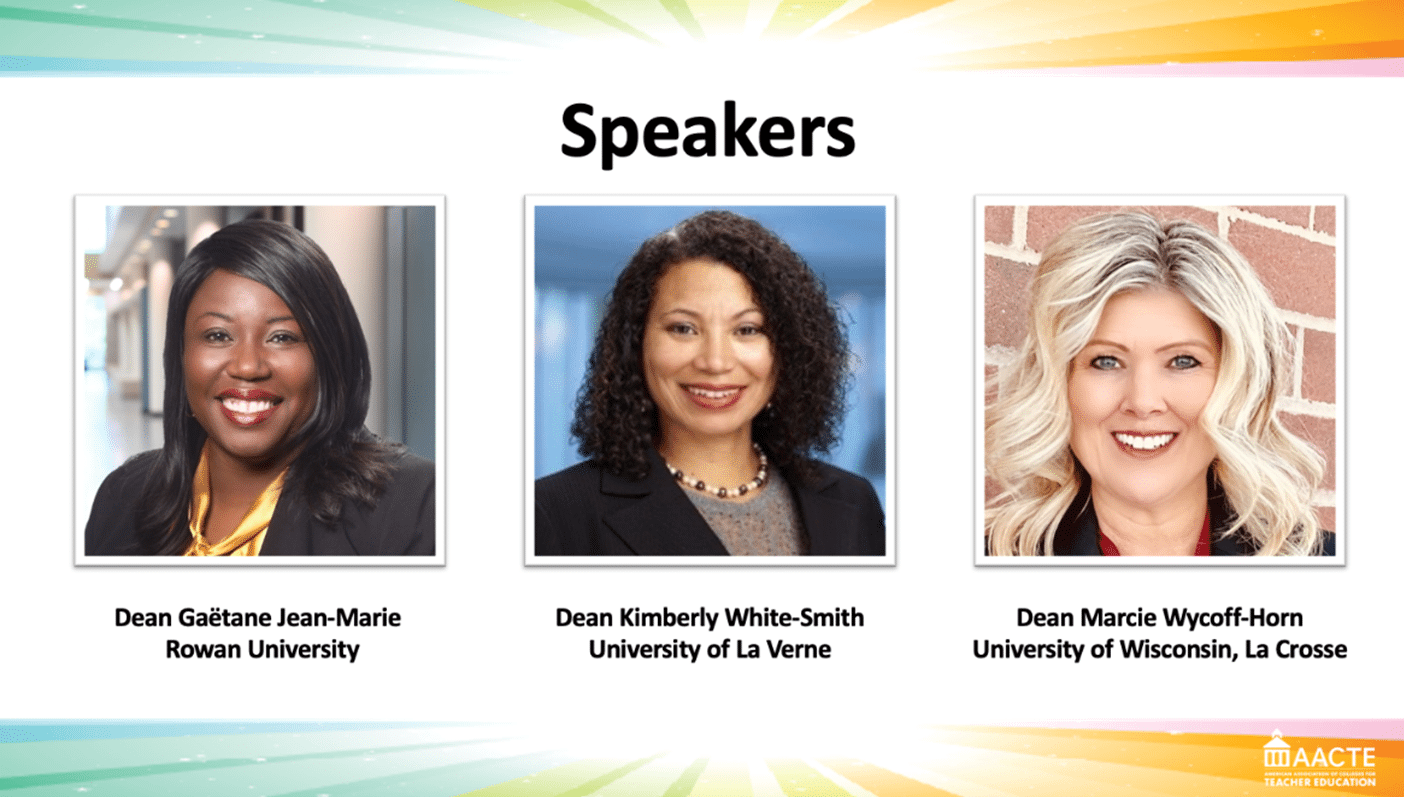
Time is running out to register for AACTE’s upcoming webinar, “Leaning in and Leading Through Crisis,” on April 29 at 2:00 – 3:00 p.m. Join Education Deans Gaëtane Jean-Marie, Kimberly White-Smith, and Marcie Wycoff-Horn in a deeper dive about how to thrive while navigating the COVID-19 and racial and social justice crises, which have impacted institutions across the nation. As equity-minded leaders, these deans will address ways to meet faculty and students’ needs by starting with empathy and ending with action.
23 Apr2021
By Linda Minor
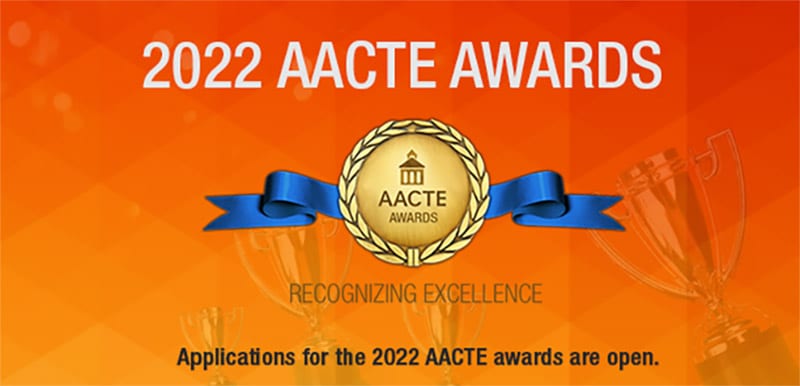 AACTE wants to recognize individuals and institutions for significant contributions to the field of educator preparation. Applications for the 2022 AACTE awards are now open. For most of the awards, programs and individuals can be either self-nominated or nominated by a third party. To submit your nomination, visit AACTE’s online submission site.
AACTE wants to recognize individuals and institutions for significant contributions to the field of educator preparation. Applications for the 2022 AACTE awards are now open. For most of the awards, programs and individuals can be either self-nominated or nominated by a third party. To submit your nomination, visit AACTE’s online submission site.
In identifying notable programs, practices, activities, writing, and research, these awards encourage all member institutions to strengthen the profession of teacher preparation through innovation, high standards, and leadership.
Entries for the Outstanding Book Award are due May 14 and entries for the Outstanding Dissertation Award are due August 20. The due date for all other award submissions is October 8.
23 Apr2021
By Nicole Dunn
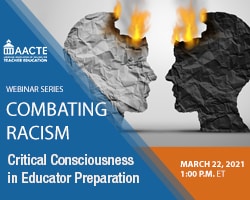 Asian American educator Elizath Kleinrock described her mindset after the reading about the anti-Asian hate crimes in Atlanta last March as, “[un]able to express my sadness, frustration and rage … how could I face my students in class when my body and voice are noticeably shaking?” With anti-Asian hate crimes up 149% in major cities due to increased negative stereotyping amidst the COVID-19 pandemic, the educator preparation community must increase its awareness and efforts by teaching true allyship in U.S. schools and communities.
Asian American educator Elizath Kleinrock described her mindset after the reading about the anti-Asian hate crimes in Atlanta last March as, “[un]able to express my sadness, frustration and rage … how could I face my students in class when my body and voice are noticeably shaking?” With anti-Asian hate crimes up 149% in major cities due to increased negative stereotyping amidst the COVID-19 pandemic, the educator preparation community must increase its awareness and efforts by teaching true allyship in U.S. schools and communities.
In AACTE’s next Combating Racism in Educator Prep series webinar, a distinguished panel will guide a conversation that addresses the often-omitted civil rights history of the Asian American and Pacific Islander (AAPI) here in the United States and resources for teaching that history and why it’s essential in our collective fight to combat systemic racial oppression in our education system. AACTE is ready to seize this present moment to respond to Anti-AAPI racism as an association and hopes you join in these efforts.
Register today to attend the webinar on April 29, 3:30 p.m. EST.
19 Apr2021
By David Fuentes and Amy Ginsberg
In the following article, David A. Fuentes and Amy Ginsberg of the College of Education at William Paterson, a member of AACTE’s Network Improvement Community (NIC) Black and Hispanic/Latino Male Teacher Initiative, take a deep dive into their efforts to increase dual enrollment opportunities as a preemptive recruitment strategy. They provide insight into how network improvement science can be used to identify levers within education preparation program systems that can improve recruitment and retention of diverse teacher candidates.
To learn more about NIC members’ initiatives to recruit and retain Black and Latina males, watch the Building Recruitment Pathways, a segment of AACTE’s new NIC video case studies series.
Building and Sustaining Recruitment Pathways for Black and Latino Male Teachers
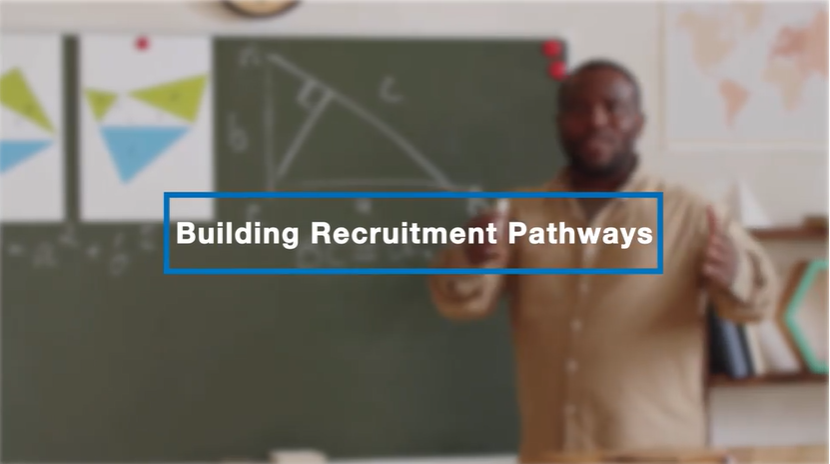 In 2014, our College of Education at William Paterson University, a Hispanic Serving Institution (HSI) and Minority Serving Institution (MSI), located in the greater New York City area, was selected as one of ten universities to participate in the AACTE Network Improvement Community (NIC), aimed at increasing the number of Black and Latino/Hispanic male teachers (BLMs). Since that time, we have been engaged in iterative cycles of plan-do-study-act (PDSA). This systematic research first led to our becoming NIC mindful and then to several structural changes in our College of Education that make our efforts aimed at teacher diversification more possible today in both theory and practice. We have uncovered, implemented, and tested the efficacy of several structural changes at our institution targeting key drivers, recruitment and retention, while implementing new structures based on network improvement science and our desire and commitment to diversify our teacher candidate pool.
In 2014, our College of Education at William Paterson University, a Hispanic Serving Institution (HSI) and Minority Serving Institution (MSI), located in the greater New York City area, was selected as one of ten universities to participate in the AACTE Network Improvement Community (NIC), aimed at increasing the number of Black and Latino/Hispanic male teachers (BLMs). Since that time, we have been engaged in iterative cycles of plan-do-study-act (PDSA). This systematic research first led to our becoming NIC mindful and then to several structural changes in our College of Education that make our efforts aimed at teacher diversification more possible today in both theory and practice. We have uncovered, implemented, and tested the efficacy of several structural changes at our institution targeting key drivers, recruitment and retention, while implementing new structures based on network improvement science and our desire and commitment to diversify our teacher candidate pool.
16 Apr2021
By Kari Vogelgesang
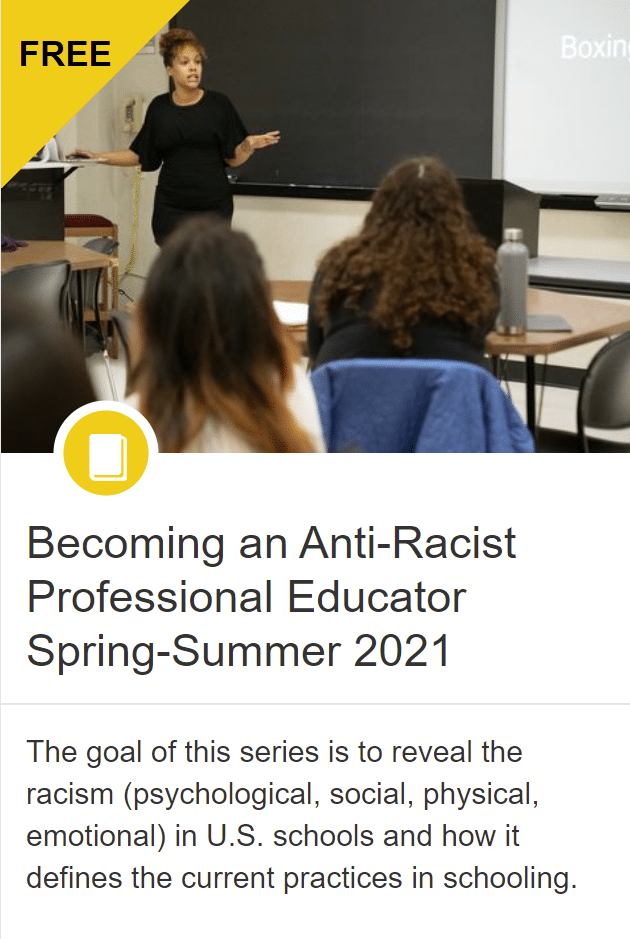 The Baker Teacher Leader Center in the College of Education at the University of Iowa is hosting an Anti-Racism Professional Educator Webinar Series. The goal of this series is to reveal the racism (psychological, social, physical, emotional) in U.S. schools and how it defines the current practices in schooling. We will explore the kinds of changes school personnel must make in their interactions, engagement, and environment to work towards anti-racism. In this series, we will decenter Whiteness and interrogate your positionality within society, but specifically within schools.
The Baker Teacher Leader Center in the College of Education at the University of Iowa is hosting an Anti-Racism Professional Educator Webinar Series. The goal of this series is to reveal the racism (psychological, social, physical, emotional) in U.S. schools and how it defines the current practices in schooling. We will explore the kinds of changes school personnel must make in their interactions, engagement, and environment to work towards anti-racism. In this series, we will decenter Whiteness and interrogate your positionality within society, but specifically within schools.
Educators who register for and attend all nine sessions in the series will earn one free teacher license renewal credit! Register here for the credit. This credit has been pre-approved for state of Iowa teachers. If you live outside the state of Iowa, please contact your administration or board of educational examiners for approval. If you have missed the first few sessions, and are still interested in earning licensure renewal credit, please contact the Baker Teacher Leader Center at tlc@uiowa.edu.
Kari Vogelgesang is clinical associate professor; edTPA coordinator, El Ed & SpEd; and director, professional development at Baker Teacher Leader Center, College of Education, University of Iowa.
13 Apr2021
By K. Stanley Brooks
 Stanley Brooks of Chosen Path Consulting was one of three presenters of the 2021 Annual Meeting session, “Identifying, Understanding, and Replacing Racist Curricula.” In this article, Brooks expounds on the key questions for inquiry and reflection on what it means to engage in an anti-racist (not non-racist) manner in the academic space.
Stanley Brooks of Chosen Path Consulting was one of three presenters of the 2021 Annual Meeting session, “Identifying, Understanding, and Replacing Racist Curricula.” In this article, Brooks expounds on the key questions for inquiry and reflection on what it means to engage in an anti-racist (not non-racist) manner in the academic space.
The reader may perceive the title and guiding question as sarcastic, however, there’s a serious tone and authenticity to the question. If our curriculum is not already anti-racist, then what have we been allowing and promoting all these years? What thoughts and beliefs rooted in racial biases have many educators internalized as children, young adults, and seasoned professionals?
12 Apr2021
By Jacqueline Rodriguez
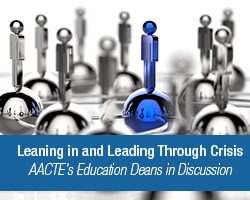 We learned so much from our education deans during the 2021 Annual Meeting that we are hosting a webinar on April 29 to dive deeper into leaning in and leading through the COVID-19 pandemic, and the impact of systemic racism on campus and within their communities.
We learned so much from our education deans during the 2021 Annual Meeting that we are hosting a webinar on April 29 to dive deeper into leaning in and leading through the COVID-19 pandemic, and the impact of systemic racism on campus and within their communities.
Educator preparation leaders, specifically, are managing the twin crisis of the COVID-19 pandemic and racial injustice within and across the nation’s institutions. We can all agree that the shift we experienced in our personal and professional lives as we witnessed horrific tragedies grounded in racism and discrimination continues to rock our schools and communities. As equity-minded leaders, three deans addressed faculty and student needs by starting with empathy and ending with action.
09 Apr2021
By Amanda Morales
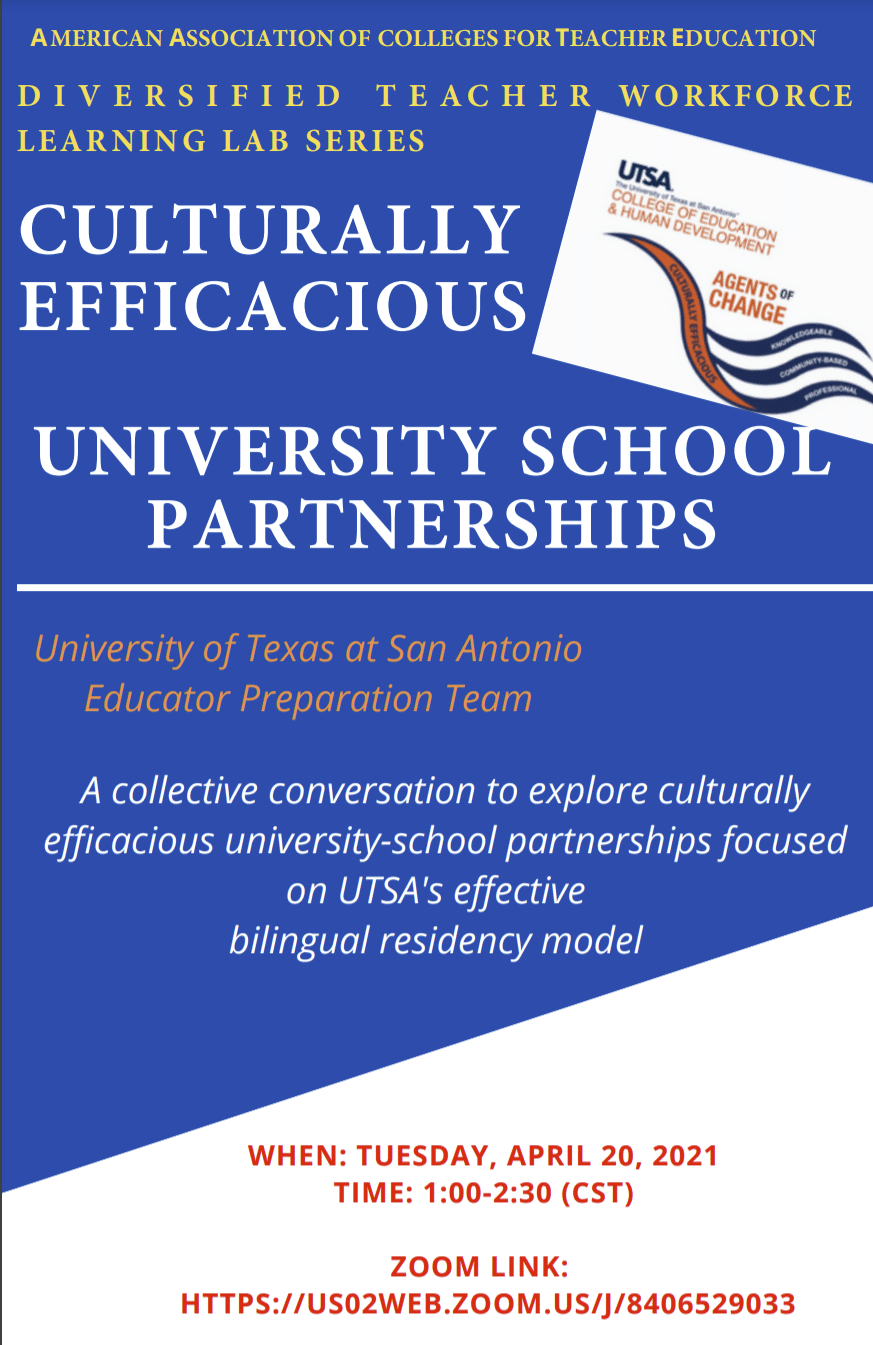 Join the AACTE Diversified Teacher Workforce Topical Action Group (TAG) Learning Lab on Building Culturally Efficacious University-School Partnerships on Tuesday April 2O, 1:00 -2:30 p.m. (CST) via the Zoom: https://us02web.zoom.us/j/8406529033
Join the AACTE Diversified Teacher Workforce Topical Action Group (TAG) Learning Lab on Building Culturally Efficacious University-School Partnerships on Tuesday April 2O, 1:00 -2:30 p.m. (CST) via the Zoom: https://us02web.zoom.us/j/8406529033
Across the field of education (PK-20) students, teachers, administrators, professors, and program leaders continue to witness and lament the chronic disparities in representation and lack of ethno-racial and linguistic diversity among teachers (relative to their students) in our nation’s schools. And in the wake of a global pandemic, enduring civil unrest, and calls for racial justice related to systemic anti-Blackness and anti-immigrant within all aspects of society, educational institutions are being forced to engage in introspection with greater magnitude. Teacher preparation programs in particular are feeling increased pressure to recruit, retain, and effectively prepare a highly-qualified, racially-literate, diverse pool of candidates as districts scramble to hire teachers with the content knowledge and pedagogical skills as well as the cultural and linguistic competencies needed to meet the needs of their increasingly diverse student populations.
06 Apr2021
By Nicole Dunn
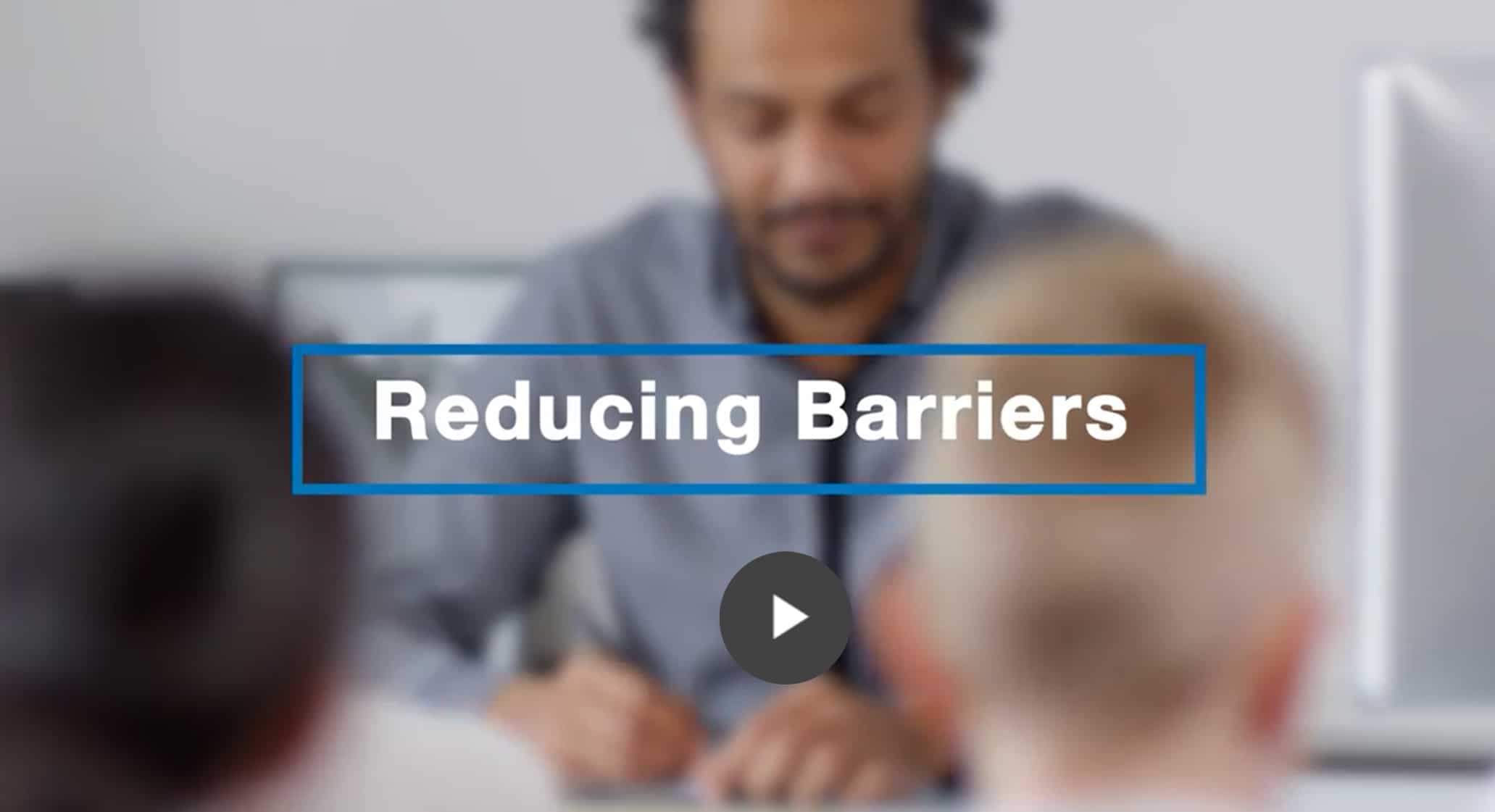
With the exacerbation of our nation’s teacher shortage brought on by the pandemic, the new White House administration will need to address this crisis strategically, keeping equity top of mind. As AACTE looks forward to improving the capacity and representation in the teacher workforce, it is essential for policy makers to tie decisions back to the historical context of structural oppression that has created barriers for a diverse teacher workforce in the past. As part of the AACTE Network Improvement Community (NIC) Black and Hispanic/Latino Male Teacher Initiative, NIC members identified a number of barriers and solutions to these obstacles, which are highlighted in Reducing Barriers, a segment of AACTE’s new NIC video case studies series.
30 Mar2021
By Gaelle Gilbert
During the Washington Post Live’s webinar, “U.S. Higher Education: Rethinking the Possibilities,” AACTE’s Dean in Residence Leslie Fenwick, dean emeritus of Howard University School of Education, was interviewed by Eugene Scott as the first of the two guests. The interview was comprised of questions covering different facets of the education space including policy, diversity, student loans, and the pandemic.
The first question addressed President Joe Biden and what Fenwick believed should be his top priority in regard to education policy. Fenwick response focused on embracing a new and more diverse student population both in the workforce and higher education. She delved into specifics of the increasing majority of non-White students in public schools beginning in 2018 and continuing on an upward trajectory.







 AACTE is honored to share that it has joined the leaders from the nation’s largest health, education, child welfare, legal, and juvenile justice organizations in support of the Human Rights Campaign’s Project THRIVE, a multi-year national campaign to create more equitable, inclusive support systems and communities for LGBTQ youth. The initiative will build the skills and capacities of all youth-serving professionals to better meet the needs of LGBTQ young people.
AACTE is honored to share that it has joined the leaders from the nation’s largest health, education, child welfare, legal, and juvenile justice organizations in support of the Human Rights Campaign’s Project THRIVE, a multi-year national campaign to create more equitable, inclusive support systems and communities for LGBTQ youth. The initiative will build the skills and capacities of all youth-serving professionals to better meet the needs of LGBTQ young people.

 The COVID-19 pandemic shed a harsh light on the systemic inequities in schools and communities. If we believe schools are the epicenter to dismantle racism and inequities, then we must examine our role as teacher educators to address these issues of inequality. How can we use this inflection point to positively and substantively change educator preparation?
The COVID-19 pandemic shed a harsh light on the systemic inequities in schools and communities. If we believe schools are the epicenter to dismantle racism and inequities, then we must examine our role as teacher educators to address these issues of inequality. How can we use this inflection point to positively and substantively change educator preparation?
 AACTE wants to recognize individuals and institutions for significant contributions to the field of educator preparation. Applications for the 2022 AACTE awards are now open. For most of the awards, programs and individuals can be either self-nominated or nominated by a third party. To submit your nomination, visit
AACTE wants to recognize individuals and institutions for significant contributions to the field of educator preparation. Applications for the 2022 AACTE awards are now open. For most of the awards, programs and individuals can be either self-nominated or nominated by a third party. To submit your nomination, visit  Asian American educator
Asian American educator 
 The Baker Teacher Leader Center in the College of Education at the University of Iowa is hosting an
The Baker Teacher Leader Center in the College of Education at the University of Iowa is hosting an  Stanley Brooks of Chosen Path Consulting was one of three presenters of the 2021 Annual Meeting session, “Identifying, Understanding, and Replacing Racist Curricula.” In this article, Brooks expounds on the key questions for inquiry and reflection on what it means to engage in an anti-racist (not non-racist) manner in the academic space.
Stanley Brooks of Chosen Path Consulting was one of three presenters of the 2021 Annual Meeting session, “Identifying, Understanding, and Replacing Racist Curricula.” In this article, Brooks expounds on the key questions for inquiry and reflection on what it means to engage in an anti-racist (not non-racist) manner in the academic space. We learned so much from our education deans during the 2021 Annual Meeting that we are hosting a webinar on April 29 to dive deeper into leaning in and leading through the COVID-19 pandemic, and the impact of systemic racism on campus and within their communities.
We learned so much from our education deans during the 2021 Annual Meeting that we are hosting a webinar on April 29 to dive deeper into leaning in and leading through the COVID-19 pandemic, and the impact of systemic racism on campus and within their communities. Join the AACTE Diversified Teacher Workforce Topical Action Group (TAG) Learning Lab on Building Culturally Efficacious University-School Partnerships on Tuesday April 2O, 1:00 -2:30 p.m. (CST) via the Zoom:
Join the AACTE Diversified Teacher Workforce Topical Action Group (TAG) Learning Lab on Building Culturally Efficacious University-School Partnerships on Tuesday April 2O, 1:00 -2:30 p.m. (CST) via the Zoom: 